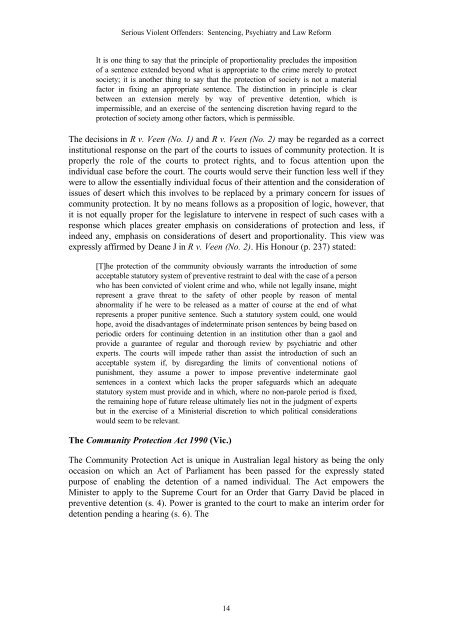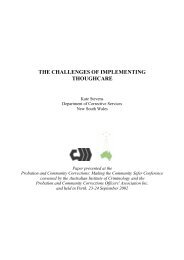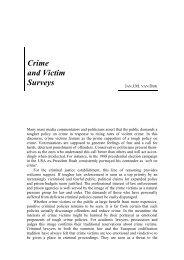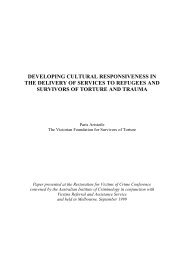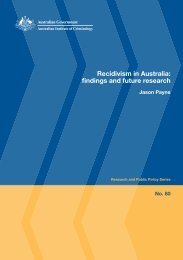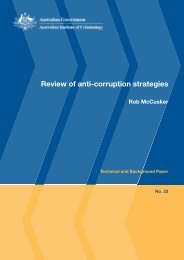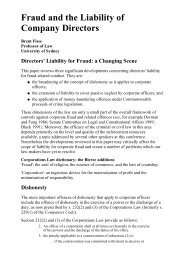Coping with the highly dangerous : issues of principle raised by ...
Coping with the highly dangerous : issues of principle raised by ...
Coping with the highly dangerous : issues of principle raised by ...
Create successful ePaper yourself
Turn your PDF publications into a flip-book with our unique Google optimized e-Paper software.
Serious Violent Offenders: Sentencing, Psychiatry and Law Reform<br />
It is one thing to say that <strong>the</strong> <strong>principle</strong> <strong>of</strong> proportionality precludes <strong>the</strong> imposition<br />
<strong>of</strong> a sentence extended beyond what is appropriate to <strong>the</strong> crime merely to protect<br />
society; it is ano<strong>the</strong>r thing to say that <strong>the</strong> protection <strong>of</strong> society is not a material<br />
factor in fixing an appropriate sentence. The distinction in <strong>principle</strong> is clear<br />
between an extension merely <strong>by</strong> way <strong>of</strong> preventive detention, which is<br />
impermissible, and an exercise <strong>of</strong> <strong>the</strong> sentencing discretion having regard to <strong>the</strong><br />
protection <strong>of</strong> society among o<strong>the</strong>r factors, which is permissible.<br />
The decisions in R v. Veen (No. 1) and R v. Veen (No. 2) may be regarded as a correct<br />
institutional response on <strong>the</strong> part <strong>of</strong> <strong>the</strong> courts to <strong>issues</strong> <strong>of</strong> community protection. It is<br />
properly <strong>the</strong> role <strong>of</strong> <strong>the</strong> courts to protect rights, and to focus attention upon <strong>the</strong><br />
individual case before <strong>the</strong> court. The courts would serve <strong>the</strong>ir function less well if <strong>the</strong>y<br />
were to allow <strong>the</strong> essentially individual focus <strong>of</strong> <strong>the</strong>ir attention and <strong>the</strong> consideration <strong>of</strong><br />
<strong>issues</strong> <strong>of</strong> desert which this involves to be replaced <strong>by</strong> a primary concern for <strong>issues</strong> <strong>of</strong><br />
community protection. It <strong>by</strong> no means follows as a proposition <strong>of</strong> logic, however, that<br />
it is not equally proper for <strong>the</strong> legislature to intervene in respect <strong>of</strong> such cases <strong>with</strong> a<br />
response which places greater emphasis on considerations <strong>of</strong> protection and less, if<br />
indeed any, emphasis on considerations <strong>of</strong> desert and proportionality. This view was<br />
expressly affirmed <strong>by</strong> Deane J in R v. Veen (No. 2). His Honour (p. 237) stated:<br />
[T]he protection <strong>of</strong> <strong>the</strong> community obviously warrants <strong>the</strong> introduction <strong>of</strong> some<br />
acceptable statutory system <strong>of</strong> preventive restraint to deal <strong>with</strong> <strong>the</strong> case <strong>of</strong> a person<br />
who has been convicted <strong>of</strong> violent crime and who, while not legally insane, might<br />
represent a grave threat to <strong>the</strong> safety <strong>of</strong> o<strong>the</strong>r people <strong>by</strong> reason <strong>of</strong> mental<br />
abnormality if he were to be released as a matter <strong>of</strong> course at <strong>the</strong> end <strong>of</strong> what<br />
represents a proper punitive sentence. Such a statutory system could, one would<br />
hope, avoid <strong>the</strong> disadvantages <strong>of</strong> indeterminate prison sentences <strong>by</strong> being based on<br />
periodic orders for continuing detention in an institution o<strong>the</strong>r than a gaol and<br />
provide a guarantee <strong>of</strong> regular and thorough review <strong>by</strong> psychiatric and o<strong>the</strong>r<br />
experts. The courts will impede ra<strong>the</strong>r than assist <strong>the</strong> introduction <strong>of</strong> such an<br />
acceptable system if, <strong>by</strong> disregarding <strong>the</strong> limits <strong>of</strong> conventional notions <strong>of</strong><br />
punishment, <strong>the</strong>y assume a power to impose preventive indeterminate gaol<br />
sentences in a context which lacks <strong>the</strong> proper safeguards which an adequate<br />
statutory system must provide and in which, where no non-parole period is fixed,<br />
<strong>the</strong> remaining hope <strong>of</strong> future release ultimately lies not in <strong>the</strong> judgment <strong>of</strong> experts<br />
but in <strong>the</strong> exercise <strong>of</strong> a Ministerial discretion to which political considerations<br />
would seem to be relevant.<br />
The Community Protection Act 1990 (Vic.)<br />
The Community Protection Act is unique in Australian legal history as being <strong>the</strong> only<br />
occasion on which an Act <strong>of</strong> Parliament has been passed for <strong>the</strong> expressly stated<br />
purpose <strong>of</strong> enabling <strong>the</strong> detention <strong>of</strong> a named individual. The Act empowers <strong>the</strong><br />
Minister to apply to <strong>the</strong> Supreme Court for an Order that Garry David be placed in<br />
preventive detention (s. 4). Power is granted to <strong>the</strong> court to make an interim order for<br />
detention pending a hearing (s. 6). The<br />
14


